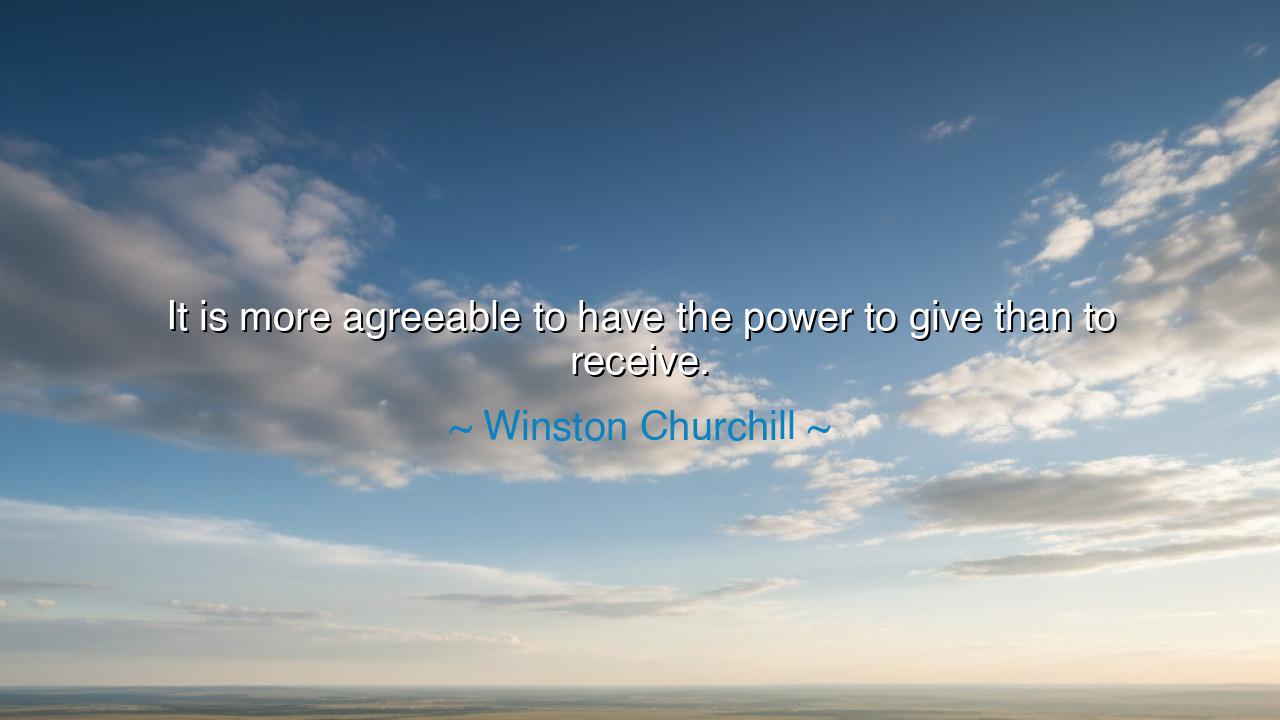
It is more agreeable to have the power to give than to receive.






Hearken, O children of virtue, to the timeless wisdom of Winston Churchill, who beheld the heart of human generosity and power. He declared that it is far more agreeable to possess the power to give than merely to receive. In this insight lies the eternal truth: the soul is ennobled when it acts as a source of blessing, of sustenance, of counsel, or of protection, and its greatness is measured not by what it gains, but by what it bestows upon others.
The origin of this reflection lies in Churchill’s life as a statesman and leader, who witnessed the vast currents of human need and the transformative force of benevolent action. During times of war and peace alike, he understood that true power is not the privilege of self-indulgence, but the capacity to enrich the lives of others, to shield them from harm, and to advance the common good. In giving, he perceived, one exercises authority with wisdom, and finds joy deeper than that which comes from mere possession.
The meaning of this aphorism resonates beyond governance and politics. It teaches that the highest exercise of influence is not coercion or accumulation, but the ability to serve and to uplift. A man or woman who can give—be it of knowledge, resources, courage, or compassion—finds satisfaction and moral elevation that the act of receiving cannot bestow. This is the eternal paradox of power: it is most noble when employed not for self, but for the benefit of others.
History illuminates Churchill’s truth. Consider the deeds of Abraham Lincoln, who wielded the authority of the presidency to preserve a nation, emancipate the enslaved, and sustain the moral fiber of his people. In doing so, he demonstrated that the power to give—to grant freedom, justice, and protection—brings enduring gratification, far surpassing the fleeting pleasure of personal gain. Here, the act of giving shapes destiny, uplifts the soul, and leaves a legacy of noble influence.
Moreover, this wisdom applies to the humble as well as the mighty. The father who imparts knowledge, the teacher who fosters curiosity, the friend who offers counsel in times of trial—all exercise the power to give, and through this, find a joy and dignity that receiving alone cannot confer. Churchill’s words remind us that the essence of human flourishing is found not in the accumulation of wealth, accolades, or comforts, but in the capacity to bestow, to bless, and to share.
O generations yet to come, take this counsel into your hearts: seek always the power to give, and wield it with courage, wisdom, and love. For in giving, the spirit is fortified, the world is enriched, and the soul discovers a joy deeper than any reward that can be received. Let your legacy be measured not by what you have taken, but by the bounty you have offered to others, and thus may your life shine as a beacon of generous power across the ages.






GNGia Nhi
I find myself reflecting on the balance between empowerment and humility. Does the pleasure of giving derive from the control and authority it represents, or from genuine compassion and care for others? I’d like to explore how this duality affects human behavior and ethical decision-making. Can the act of giving cultivate wisdom and emotional growth, and how might this insight guide individuals to approach generosity in a thoughtful and intentional way?
TH11_ Ly Tang Huu
This statement makes me think about how giving and receiving shape human relationships. Could it be that giving fosters empathy, gratitude, and trust, while receiving often creates dependence or obligation? I’m curious whether the act of giving must be selfless to be more agreeable, or if even strategic or transactional giving can provide satisfaction. How might this idea inform charitable practices, mentorship, or leadership strategies in personal and professional contexts?
TDThuan Dang
Reading this, I question whether the statement reflects practical experience or moral philosophy. Does Churchill mean that giving provides emotional satisfaction and strengthens social bonds, or is it more about the assertion of influence? I’d like to hear perspectives on whether modern society undervalues the joys of giving, especially when people are encouraged to pursue material gain and personal benefit over altruism and shared welfare.
PHPham Huyen
I’m intrigued by the idea that power and generosity are intertwined. Could the enjoyment of giving stem from the ability to make a meaningful impact on someone else’s life? I’d like to explore whether this perspective implies a responsibility for those with resources or authority to give, and how this aligns with ethical leadership and social responsibility. Does the pleasure of giving outweigh the risks of pride or condescension?
HTPhung Thi Huyen Trang
This quote makes me reflect on the psychology of generosity and power. Does Churchill suggest that the act of giving is inherently more fulfilling than receiving because it confers influence, purpose, or control? I wonder whether this sentiment applies universally, or if some people find greater satisfaction in receiving and appreciating the generosity of others. How do cultural norms and personal values shape the preference for giving over receiving?